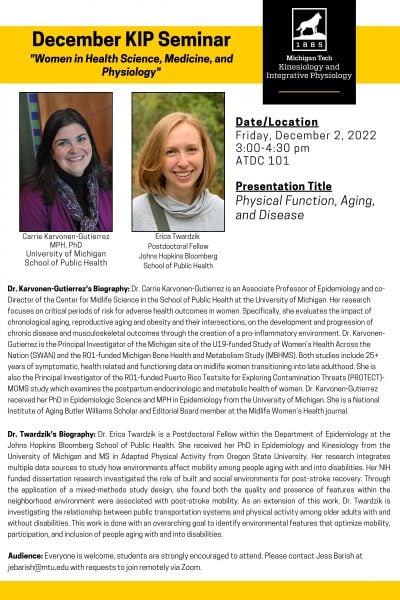Join us for the last seminar of the semester to close out the “Women in Health Science, Medicine, and Physiology” series.
Dr. Carrie Karvonen-Gutierrez and Dr. Erica Twardzik will be presenting their research and work. To learn more about the speakers, find their abstracts and biographies below.
Dr. Karvonen-Gutierrez’s Abstract: Among older adults (age 65+ years), declines in physical functioning, increases in disability and the relationship of falls with adverse outcomes including hospitalizations and death are well documented. However, evidence suggests that the mid-life period (40-64 years of age) is a critical window for the onset of poor physical functioning and falls, particularly in women. Women experience greater disability, more rapid declines in physical functioning, and more falls than do age-matched men. This presentation will overview the burden of physical functioning limitations, disability and falls among mid-life women and identify important correlates of these health outcomes. Key findings from the ongoing Study of Women’s Health Across the Nation, a prospective, multi-ethnic study of midlife women will be included to demonstrate important differences in the burden of physical functioning by key demographic measures.
Dr. Twardzik’s Abstract: Older adults with disabilities are a growing demographic group. People with disabilities represent 26.8% of the general population, and the prevalence of disability increases with age. People with disabilities, compared to non-disabled peers, are less likely to engage in physical activity and social participation, key components of healthy aging. Observed disparities are driven by a multifactorial set of environmental barriers and facilitators. This presentation will describe socio-environmental drivers of mobility among older adults and people with disabilities. Examples from recent work empirically testing relationships between built environment and mobility will be used to illustrate how environments shape mobility among people with disabilities. Environmental modification is needed to achieve societal inclusion and optimize individual participation among those aging with and into disability.
